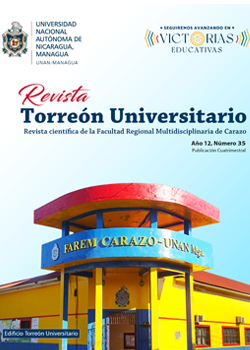Community psychology: a work to be developed in the communities of Colombia
DOI:
https://doi.org/10.5377/rtu.v12i35.17004Keywords:
Empowerment, Community psychology, Liberation psychologyAbstract
The following essay wants to reflect on community psychology as a field of knowledge, which is a recent discipline that needs to be discussed at the epistemological, ontological, and methodological levels, especially in the Latin American context because of its legacy and importance in the most vulnerable communities.
For this reason, this paper wants to identify some of the characteristics, perspectives, and possibilities of study of community psychology in the Latin American context it begins by discussing its object of study identifying a differentiation between community psychology with social psychology, and subsequently describes its origin to establish contrasts in the North American and Latin American context. Finally, it pointed out the importance of community psychology in the Colombian context that takes into account a perspective of the psychology of the liberation of Ignacio Baros and the empowerment of communities in the post-conflict process that the country is currently experiencing.
Downloads
References
Berroeta, H. (Ed.). (2012). Teoría y práctica de la acción comunitaria: aportes desde la psicología comunitaria. Santiago de Chile, CL: RIL editores. Leer pág. 1-25. https://elibro-net.bibliotecavirtual.unad.edu.co/es/ereader/unad/68254?page=1
Clay, H. (1979). Introducción a la Psicología Social. Edit. Trillas, México.
Diez, J., Escudero, H., Carballeda, A., Barberena, M., Hallak, Z., Rocha, E., Massera, C., Vázquez, A., Barceló, M., Coñuecar, V., Gómez, P., Gómez, D., Feü, C., Martínez, N., & Moreno, N. (2012). Cartografía Social: La investigación e intervención desde las ciencias sociales y experiencia de aplicación. 1a ed. ISBN: 978-987-21581-8-7. Comodoro Rivadavia: Universitaria de la Patagonia, pág. 5-8. Recuperado de: https://www.margen.org/Libro1.pdf
Fernández, I., Morales, F., Molero, F. (2011). Psicología de la intervención comunitaria. Bilbao, ES: Editorial Desclée de Brouwer. Leer Cap. 3. Recuperado de https://elibro-net.bibliotecavirtual.unad.edu.co/es/ereader/unad/108806?page=98
Lahey, B. (2010). Introducción a la Psicología. Madrid: McGraw-Hill. 9ª edición.
Misitu, G., (2004) Surgimiento y desarrollo de la psicología comunitaria. En Misitu, G., Herrero. O., Cantera. E. (2004). Introducción a la psicología comunitaria. Barcelona. España. Ed. UCO. Leer Cap. 1. pag18 Recuperado de https://elibro-net.bibliotecavirtual.unad.edu.co/es/ereader/unad/56318?page=18
Montero, M. (2004). Introducción a la psicología comunitaria: Desarrollo, conceptos y procesos. Paidós.
Morales, M. y Banda, A. (2015). Empoderamiento psicológico: un modelo sistémico con componentes individuales y comunitarios. Revista de Psicología. Pontificia Universidad Católica del Perú Lima, Perú. Recuperado de http://www.redalyc.org/articulo.oa?id=337838597001
Moscovici, S. (1984). El campo de la psicología social. Moscovici S. La psicología social I. Barcelona, España: Paidós.
Veiga-Seijo, S., Movilla-Fernández, M. J., & Rivas-Quarneti, N. (2020). Scoping review sobre el Metaplan como metodología de investigación cualitativa en Ciencias de la Salud. New Trends in Qualitative Research, 3, 1000-1007.
Cabanilla, B. (2010, diciembre). Ignacio Martín Baró y la mirada psicosocial (o la unión de examen, crítica y ética desde Latinoamérica). Reflexión, 39, 24-28.
Published
How to Cite
Issue
Section
License
Copyright (c) 2023 National Autonomous University of Nicaragua, Managua

This work is licensed under a Creative Commons Attribution-NonCommercial-NoDerivatives 4.0 International License.
Los autores que publican en esta revista están de acuerdo con los siguientes términos.
- El autor o los autores de los artículos, ensayos o investigaciones conceden a la Universidad Nacional Autónoma de Nicaragua, Managua (UNAN-Managua) los derechos de edición (copyright) del trabajo enviado, por consiguiente la Universidad cuenta con el derecho exclusivo para publicar el artículo durante el periodo completo de los derechos de autor.
- Estos derechos de autor/ autores autorizan a la Revista Torreón Universitario y a la Universidad editar y divulgar/publicar el artículo en dicha Revista, incluyendo reproducción impresa y electrónica, el almacenamiento, recuperación y cualquier otro tipo de publicación, y fuentes de información secundaria como servicios de resúmenes y bases de datos, así mismo la facultan a proteger el artículo contra el uso no autorizado para su difusión por medios impresos o electrónicos (PDF, HTML, EPUB, XML u otros).
Licencia para el uso del contenido
La revista hace uso de la Licencia Creative Commons Atribución-NoComercial-SinDerivar 4.0 Internacional.
Bajo esta declaración:

Este revista está sujeta a una licencia de Creative Commons Reconocimiento-NoComercial-SinObraDerivada 4.0 Internacional. Puede ser copiada, distribuida y transmitida públicamente siempre y cuando se cite al autor y la fuente (Revista Torreón Universitario), no debe modificarse ni utilizarse con ningún fin comercial. La licencia completa se puede consultar en http://creativecommons.org/licenses/by-nc-nd/4.0/.

